| Reviews & Columns |
|
Reviews DVD TV on DVD Blu-ray 4K UHD International DVDs In Theaters Reviews by Studio Video Games Features Collector Series DVDs Easter Egg Database Interviews DVD Talk Radio Feature Articles Columns Anime Talk DVD Savant Horror DVDs The M.O.D. Squad Art House HD Talk Silent DVD
|
DVD Talk Forum |
|
|
| Resources |
|
DVD Price Search Customer Service #'s RCE Info Links |
|
Columns
|
|
|
Greatest Heroes of the Bible: Volume Three - God's Power (Tower of Babel, Sodom & Gomorrah, Jacob's Challenge, Joseph in Egypt)
Reviewer's Note: This Easter week, I reviewed the first two volumes of Paramount's three Greatest Heroes of the Bible releases. Since these volumes constitute episodes from the same series/miniseries, I'll port over the same opening from those reviews for this third entry, with additional thoughts on the new episodes.
Forgive them, Father, for they know not this is Schick Sunn Classic entertainment. CBS DVD and Paramount have released Greatest Heroes of the Bible: Volume Three - God's Power, a single-disc gathering of four episodes of the NBC...miniseries? series? special events? that aired sporadically during the 1978-1979 season. Episodes included here are: The Tower of Babel, Sodom and Gomorrah, Jacob's Challenge, and Joseph in Egypt. Produced by the legendary Schick Sunn Classic Pictures indie (I'm about to faint...), Greatest Heroes of the Bible looks to be an effort by the studio and NBC to hopefully recreate the success of their previous joint effort, The Life and Times of Grizzly Adams. As far as I can tell--and info is scarce on this series/miniseries--Greatest Heroes of the Bible didn't repeat that ratings victory. In my review for Greatest Heroes of the Bible's first volume (which was written before I watched two and three), I recommended that lovers of all things Sunn Classic (and that would most fervently include me) would absolutely not want to miss out on these three discs, even if these episodes appear to be out of air date order, with runtimes all over the map...and with three episodes missing from the group. That's still true...but why the hell aren't these particular episodes more appalling? I want Sunn Classic camp, not low-rent Insight knock-offs. Transfers are atrocious--which is just what we want with these nostalgic fullscreen discs.
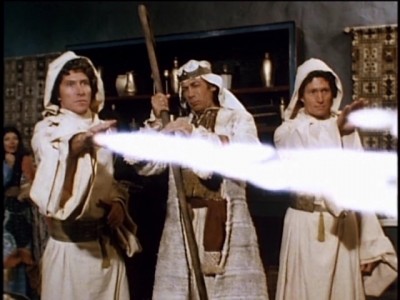
I've written many times before about my childhood love affair with those insanely hyped Schick Sunn Classic Pictures from the early-to-mid 1970s--that golden age of whacky pseudo-science/pseudo-history--when the nation's pop culture was saturated with B movies and sketchy documentaries and pulp books and magazines and TV shows and toys dealing with UFOs, Bigfoot, the Bermuda Triangle, crystal power, ESP, the Loch Ness Monster, and ancient astronauts (to list just a few). Certainly in my memories Schick Sunn Classic Pictures was one of the central drivers for all that giddy, hysterical fun, during a time of my adolescence when anything supernatural seemed not only possible but completely plausible...depending, of course, on the marketing skills of whatever company was flogging a product connected with that particular phenomenon. And nobody beat Schick Sunn Classics at marketing and promoting "must-see" family-friendly exploitation entertainment. Based out of Salt Lake City, Utah, indie Schick Sunn Classic Pictures compensated for their relative inexperience in actual moviemaking by taking a full-court press approach to pre-production marketing research (to determine target audience and choice of subject matter--why waste money making a movie nobody wants to see?). This "scientific" approach was then followed by strictly-controlled, low, low-budget production costs for the feature, and then smacked home for maximized profits by "four-walled" releasing schemes (renting the movie theatres outright for 100% of the ticket sales), hyped by ballyhoo-worthy saturation promotion on television, radio and print ads. With an almost foolproof, low-risk method of producing and/or releasing movies that were in essence "pre-sold" to a waiting public, Schick Sunn Classic Pictures produced and/or released one insanely profitable family adventure/documentary/drama after another: When the Wind Blows, The Outer Space Connection, The Adventures of Frontier Freemont, The Amazing World of Psychic Phenomena, The Mysterious Monsters (that one scared me), In Search of Noah's Ark, The Lincoln Conspiracy, Beyond and Back, The Bermuda Triangle (same), In Search of Historic Jesus, Beyond Death's Door, Hangar 18, and perhaps their most recognizable title, the 1974 theatrical version of The Life and Times of Grizzly Adams (which by various accounts pulled in somewhere between 25 to 35 million dollars in ticket sales--most going directly into Schick Sunn Classic's pockets--on a paltry $500,00 dollar investment). I saw them all, and absolutely loved them, and the day someone puts out a widescreen boxed set of those Sunn Classic titles, that's the day I drop dead from the vapors.
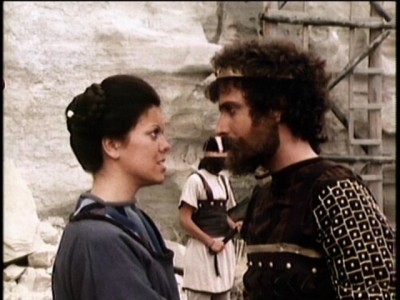
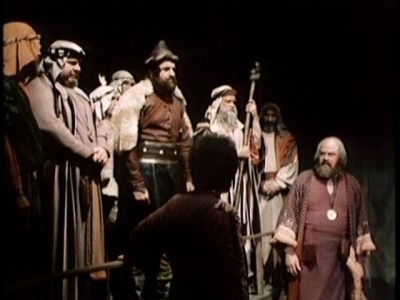
With the kind of profit margin success that the mainstream studios could only dream of, it was inevitable that savvy, chintzy Schick Sunn Classic Pictures would be approached to produce for television, with the studio's most famous effort being 1977's The Life and Times of Grizzly Adams series. According to what I've read, NBC approached Sunn when a televised airing in 1976 of the same-named 1974 movie won a sizeable chunk of the night's demographics. Third-placed NBC, with nothing to lose, signed up Sunn's one-man-band producer Charles Edward Sellier, Jr. to gather the movie's cast together for a 13-episode mid-season replacement tryout in February, 1977 (in addition to producing the original movie, Sellier also wrote the highly-fictionalized 1972 novel from which the movie was adapted). It was a demographic (but short-lived) hit for the network, so it's not surprising that desperate, struggling NBC would ask for more. And that's where Greatest Heroes of the Bible comes in. Or at least that's what I'm assuming happened, since hard, reliable info on the show is surprisingly scant. Sellier and star Sunn house director James L. Conway are listed as executive producers here (with Conway helming some of the first episodes), while various sources list Greatest Heroes of the Bible episode counts at either 17 or 15 (two episodes are listed as two-parters in the notoriously iffy IMDB, but that may be incorrect, since The Story of Noah, presented in this volume, seems complete in one episode). And that's all I could find. Was it initially a miniseries offered in the fall of '78, which led immediately to more episode orders for a quasi-series in the spring of '79 (sort of like ABC's How the West Was Won)? Or was it always an official series that got preempted and bumped around a lot? Or were these episodes "special events" for one of NBC's umbrella titles that were just slotted in and "burned off" to fill in weak spots in the schedule (...which would have been the whole schedule on NBC)? I don't know (and if there are any Greatest Heroes of the Bible experts out there, by all means email me, and I'll amend the review). Hopefully, James Conway will call me, and we'll talk about Sunn for three days straight, and then we'll all know.
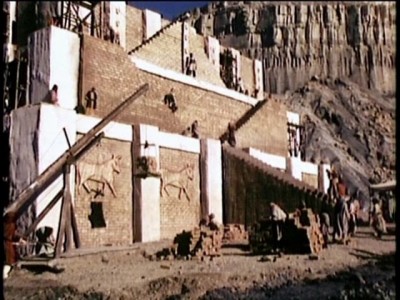
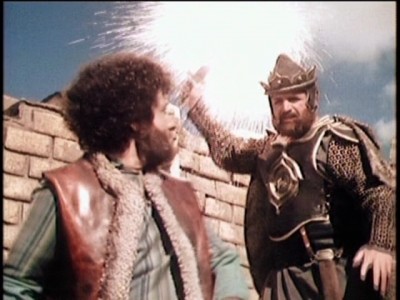
I wracked my brain to try and remember either watching Greatest Heroes of the Bible back in '78-'79, or seeing it listed in the TV Guide, but for the life of me I couldn't summon it up. None of the episodes rang a bell, although they did instantly feel as if I had seen them before, owing to their unmistakable--and thoroughly delightful--Schick Sunn Classic house style: amusingly portentous narration, shaky-at-best production values (that's being nice: they're cheap as hell), a certain barely-contained hysteria in the dialogue, and wildly varying performances from the casts of familiar faces. In the spirit of openness: if you've read a few of my reviews, you might think it odd I'm writing about these Greatest Heroes of the Bible volumes in the first place (outside of my affection for Sunn), making no bones about being a non-believer in several other religious-themed reviews (too many critics nowadays shy away from declaring their positions on anything, preferring to keep things fuzzy in the misguided, silly attempts to stay "objective" and not "offend" anyone). Well, this born-and-raised Methodist is now a most reluctant atheist...but one who also wholly supports the continued Judeo-Christian influence on Western civilization (basically, I'm distrusted by every side in the argument). As well, as nostalgic as I am for those days of my youth spent at Southwyck Cinemas and the Maumee Indoor and the Jerry Lewis Twin, where I was plunked down at a Saturday matinee with a bunch of other screaming kids who didn't know what the hell they were watching, either, until Brad Crandall's booming voice scared the bejeezus out of them, I'm also quite sentimental about those long-gone, innocent days at Sunday School, learning about the timeless stories presented here in Greatest Heroes of the Bible. I may not believe today, and I'm certainly no Biblical scholar (according to what I've read, these little adventures sometimes play quite loose with the original Bible texts)...but that doesn't mean I don't see the potential value in these morality plays, or deeply respect the faith that others have in them.
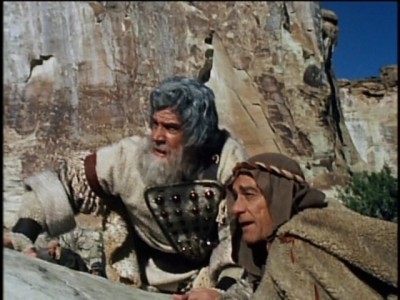
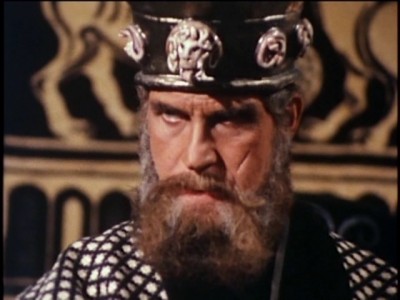
Mawkish, mostly irrelevant (and certainly irreverent) Easter Sunday sermon over. So...how about the episodes of this volume of Greatest Heroes of the Bible? How are they? Well...with the exception of some humorous casting decisions...these four mildly diverting episodes aren't at all what I want from a true Schick Sunn Classic production. Yes, the dialogue is sometimes amusingly overripe and florid; yes, the sets are still incredibly chintzy; and yes, a few of the performances lack, um...any discernable talent. Fine. Good. But you can get generalized incompetence anywhere in Hollywood. I want that magic Schick Sunn Classic ineptitude--which overwhelmed the first disc, Greatest Heroes of the Bible: Volume One - Bible's Greatest Stories--the kind where all the elements of production come together to form a product that's at once less than its parts...and then oh so much more, as it delights us with its cheap earnestness, wholesome, all-American huckstering, and almost complete incompetence. Have you seen In Search of Noah's Ark? How about The Mysterious Monsters? In Search of Historic Jesus? Well, if you haven't, then you need to, because they feature the kind of indie moviemaking I treasure from my youth: cheap, coarse, calculated, ridiculously over-hyped, wildly maladroit...and marvelously entertaining. Unfortunately, the four episodes here in Greatest Heroes of the Bible: Volume Three - God's Power have their Sunn Classic moments, but overall--they're just too average to pass the Sunn Classic "P.U." sniff test.
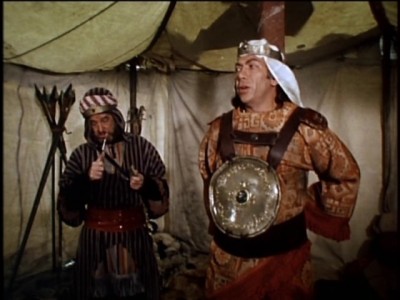
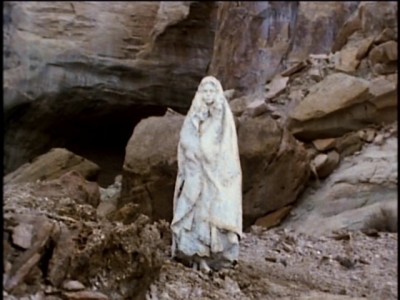
In the Beginning, there was The Tower of Babel. Arnold Horshack (Ron Palilo) and little Joannie "Shortcake" Cunningham (Erin Moran) are in love--a blessed event in TV pop culture that will eventually lead to the virgin birth of Punky Brewster (as prescribed by Scripture). But that's later in the New Testament. Right now, the obstacle to their love comes in the form of the huge monstrosity that renowned hunter Amathar (Dr. Ben Casey) is building right next to the KMart. Believing that man literally needs to get closer to God, he wants a tower--a big tower--built. Horshack will design it, and Joannie's dad, Ranol (Dana Elcar), will make the bricks...and make a handsome, tidy profit off them, too. Horshack's traditionalist father, Admiral Nelson of the Seaview (Richard Basehart), the spiritual leader of the tribe, is naturally against this idolatry, but what's he to do when everyone else backs this shovel-ready project? Soon, the whole tribe is involved in the tower construction (it takes a village...), at first willingly, and then at the point of a sword when power inevitably goes to Amathar's head, as the all-important, all-encompassing State--with a despot at its controls--now dictates life and death to the frightened, cowed people (wait...is this prophecy?). As delicious as are the possibilities inherent in that, um...eclectic cast drawing sparks, not much of interest happens in The Tower of Babel. No one is egregiously awful, nor particularly good, in their performances, with the halfway-decent tower set being the only element that stands out. It's certainly not like the vertiginous one in Huston's The Bible...in the Beginning, but it's okay for the budget. More careful scripting might have given us some insight into why Amathar "turned," but alas, there's no time for it amid the repeated scenes of various cast members whispering about the tower, and how to bring it down. Respectable but unimpressive, and worse, kinda dull.
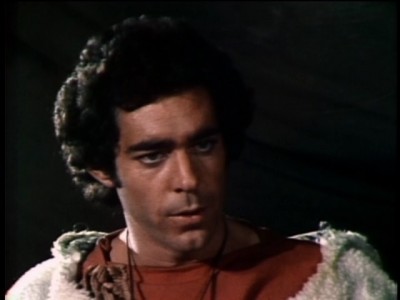
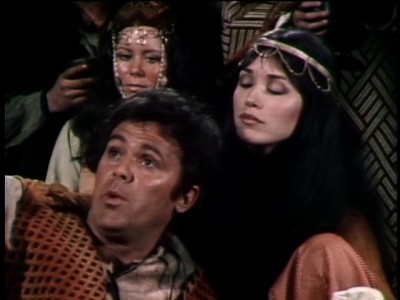
Okay: Sodom and Gomorrah. This should be good, right? Lot (Ed Ames), recognizing that's it's time to split tribes with Abraham (Gene Barry) because there's not enough grass growing to go around. Leaving for Jordan, he's welcomed by King Bera (Peter Mark Richman). Bera knows a sucker when he sees one: if Lot and the Hebrews flourish on his land, he'll get their money in taxes, and if they fail...they'll make good slaves. Lot seems fairly sanguine about being so close to the worse vice pits on earth, the cities of Sodom and Gomorrah, but his wife Nagar (Dorothy Malone) ain't complaining. Eventually, all the Jews are corrupted by the naughty pleasures of S & G, even Lot, whose ego is seduced by Bera when the King makes Lot a stooge judge. God finally flips, and decides S & G have got to go. In the second volume of Greatest Heroes of the Bible, I wrote how much I enjoyed hearing the dialogue from resonant actors Ed Ames and Gene Barry, when they enacted Abraham's Sacrifice. They still sound good here, but you're going to search in vain to see any of the "good parts" of Sodom and Gomorrah, if you know what I mean. In other words, this is all far, far too tame to adequately get across the evil degradation that is supposed to be embodied in Fun City I and II (when we're admitted to the licentious lair of King Bera's palace, his full-blown orgy consists of...two slightly swaying girls and a juggler--I had that at my seventh birthday party). I know it's TV, and TV from 1979, but still: you have to show us something to convey the absolute moral decay of S & G; otherwise, how can we see Lot overcome it? When we're told the Jews have all finally succumbed to sin, as proof we're given a shot of a guy strapped to a post, with two other guys jingling some jingle-jangles in his face (I had that at my college graduation). That's "sin?" Scripter Brian Russell and director Jack Hively keep things straight for the most part, but it's hard to credit them with the episode's best bit of business--the destruction of S & G--when most of it obviously comes from stock footage from some other movie (I can't tell if it's from Aldrich's big-screen version, or some other Italian peplum). Acting ranges from excellent (the always reliable Peter Mark Richman as silky, smooth Bera) to quite sad (a visibly reduced, at loose ends Dorothy Malone). A seeming sure-fire outing that's too good to be enjoyably junky, and not nearly funky enough to be enjoyably bad.
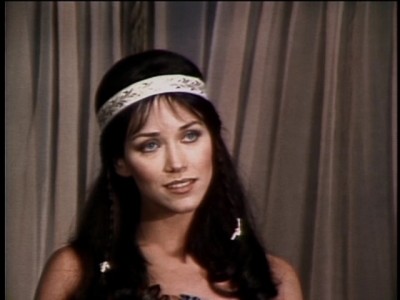
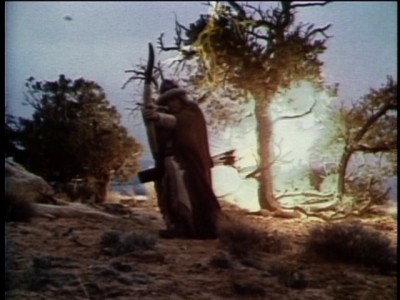
The land of Canaan, where the Hebrews and Hittites have formed an uneasy truce. In Jacob's Challenge, Greg Brady (Barry Williams) is the twin brother of Eric "Otter" Stratton (Peter Fox), of Delta House. Greg's the deep thinker, and Otter's the big stinker since he appeared first in this world, thereby gaining the birthright of his father, Douglas "Isaac" Channing (Stephen Elliott), of nearby Falcon Crest. Prophecy has foretold, however, that one day the older Otter will worship the younger Greg, but Greg can't see how that's going to happen, even with the assurance of his mother, Ruth Martin (June Lockhart). Greg resorts to tricks to gain Otter's birthright, and comes awful close to scoring with his fiance, Julie Rogers (Tanya Roberts), too. Will God finally warm to Greg, and rename him Johnny Bravo Israel? First off: finally some honest-to-God cleavage in the Greatest Heroes of the Bible, thanks in no small (ahem) part to sexy no-talent, Tanya Roberts. Written by the reliable Norman Lessing, Jacob's Challenge is straightforward enough in its storytelling, but direction by Jack Hively, unfortunately, misses the mark here, with a distinctly desultory tone dampening the proceedings (it really looks "TV," with a constant, undistinguished procession of full and head shots). Certainly the most amusing aspect of Jacob's Challenge is all those B and C-lister television stars, including a fake Tim Matheson and a Farah Fawcett/Cheryl Ladd/Shelley Hack substitute (there's even an appropriately second-string Officer Chris Owens from The Rookies). Unfortunately, aside from one hysterically funny encounter between Barry Williams and Tanya Roberts (Jacob speaks movingly of God's covenant, when a grotesquely pouting Roberts, acting like some sex kitten from a Bob Hope movie, completely ignores him and jumps in without missing a beat, "It's hot in here!" while unbuttoning her blouse--priceless), the episode is surprisingly flat, with Barry Williams' somnambulant performance coming in for a hefty portion of the blame.
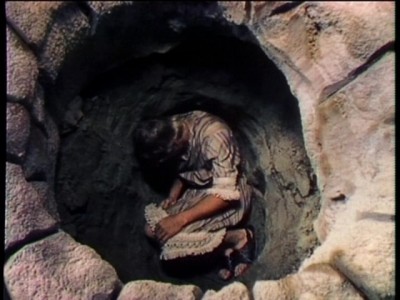
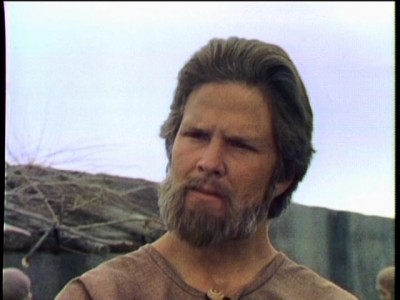
End times. In the disc's final outing, Joseph in Egypt, Joseph (Sam Bottoms), beloved son of Jacob (Walter Brooke), is set upon by his jealous, traitorous brothers, who sell him into slavery. "Rescued" by horny rich lady Nairubi (Carol Rossen), Joseph works his way up to be a trusted servant to master Potiphar (Bernie Kopell), Nairubi's henpecked husband. When Joseph rejects her advances and then cries rape, Potiphar has him sent to prison, where he eventually befriends evil warden Har-Gatep (Albert Salmi). By blind luck becoming a trusted confident of the Pharaoh (Barry Nelson), due to Joseph's ability to read God's will in anyone's dreams, Joseph now has the power to avenge himself on his treacherous brothers. The episode that comes the closest in a few scenes to the spirit of bad=better Sunn Classic outings, Joseph in Egypt is an otherwise pokey outing anchored by a...what's the word...inexplicable performance by Sam Bottoms (when he makes that verkakte stupid grin, is he playing a character with a stupid grin...or is he really stupid? You can't tell). Bernie Kopell seems to be doing dinner theater comedy when first introduced, practically winking at the audience and mugging like his Doc character on The Love Boat (the laughs come later...when he plays everything straight). Barry Nelson as Pharaoh (yep, you just read that) plays his wise Egyptian dictator the way he played all his roles: like a slightly aggrieved accounts manager at a large Midwestern insurance company. Much, much better is the always funny Carol Rossen, who camps it up something awful as Nairubi, who, when she sees the slaves out in the desert for the first time, spits out, "Tell them to keep it down, I won't have them shouting in my face with their bad breath!" I doubt "keep it down" was in the Egyptian vernacular then (or now), but she sells it. Even better, when she tries to seduce Bottoms (???), she comes out with a full-blown picked-out hairdo borrowed from Roseanne Roseannadanna, and purrs, "He [Kopell] is a goose, and you are...rare game," a line worthy of DeMille (Bottoms has a great comeback--"You are not a woman, but a wild, ugly beast! You sicken me!"--but he blows it). Unfortunately, the fun stops after this opening act when Bottoms goes to prison and meets Salmi (the original har-dee-har-har actor), before become an Egyptian big-shot, all of which unspools at an increasingly lugubrious pace. Pity; it seemed so close to stinking.
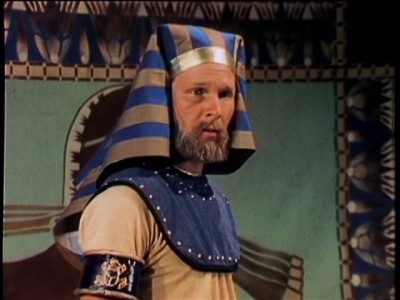
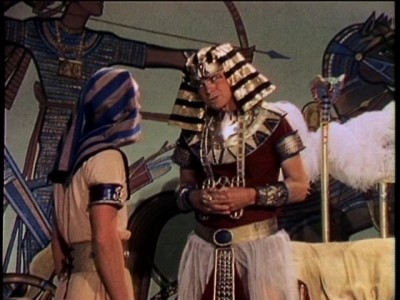
The Video:
The fullscreen, 1.37:1 video transfers for Greatest Heroes of the Bible: Volume Three - God's Power are just like the first two volumes: pretty bad, with second or even third generation VHS copies looking to be the masters here (The Tower of Babel in particular is horrible-looking). Grainy, noisy image detail, compression issues, faded color (think "beige" for everything), and lots of scratches and dirt. However, for nostalgia sake...they're perfect.
The Audio:
The Dolby Digital English stereo track is loud and squelchy (I couldn't distinguish any notable separation effects). English and Portuguese subtitles are available.
The Extras:
No extras for Greatest Heroes of the Bible: Volume Three - God's Power.
Final Thoughts:
And Schick Sunn Classic Productions looked down upon what it had made and saw that it was...good enough. I don't feel like a whole lot of people were really trying in these four episodes of the Greatest Heroes of the Bible series. They certainly weren't screwing up enough to do the Sunn Classic label justice, and yet they didn't exactly hit these episodes out of the park in terms of legitimate drama, either. With the exception of a few moments of insanity here and there, it's all rather...utilitarian and muted. A shame, especially after the ripe delights of volume one. Still...a very mild "recommend" for Schick Sunn Classic completists (oh yeah--we're out there).
Paul Mavis is an internationally published movie and television historian, a member of the Online Film Critics Society, and the author of The Espionage Filmography .


|
| Popular Reviews |
| Sponsored Links |
|
|
| Sponsored Links |
|
|
| Release List | Reviews | Shop | Newsletter | Forum | DVD Giveaways | Blu-Ray | Advertise |
|
Copyright 2024 DVDTalk.com All Rights Reserved. Legal Info, Privacy Policy, Terms of Use,
Manage Preferences,
Your Privacy Choices | |||||||













